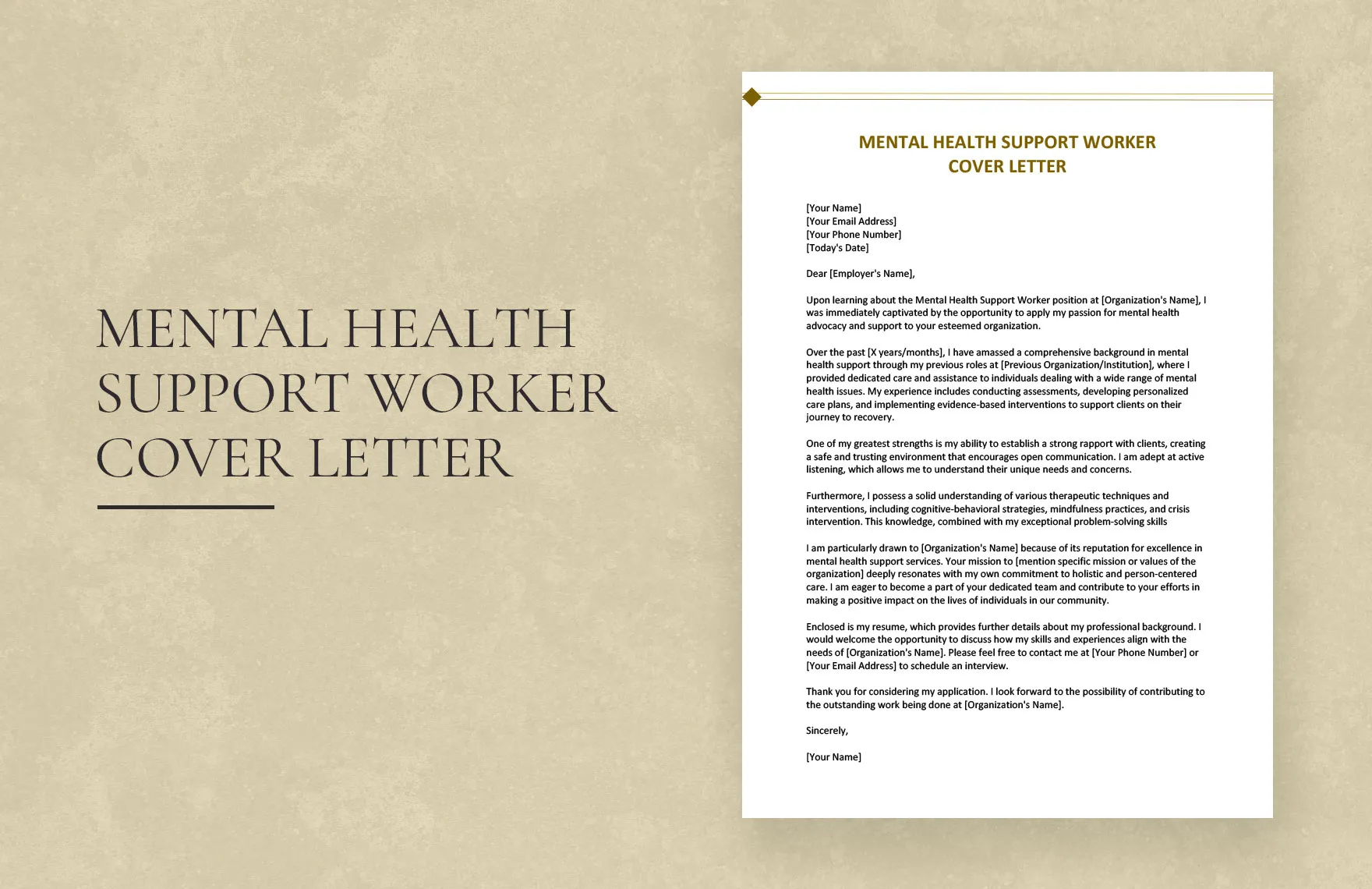Why a Strong Cover Letter Matters for Mental Health Nurses
In the competitive field of mental health nursing, a well-crafted cover letter is your first opportunity to make a lasting impression on potential employers. It’s more than just a formality; it’s a crucial tool that allows you to showcase your unique qualifications, passion for the role, and understanding of the specific needs of the position. A compelling cover letter can significantly increase your chances of landing an interview, setting you apart from other applicants who may have similar qualifications. In a profession where empathy, communication, and clinical expertise are paramount, your cover letter should reflect these qualities. It should go beyond simply restating your resume; instead, it should tell a story, illustrating how your skills and experiences align with the employer’s requirements and the specific needs of the patient population. A strong cover letter not only highlights your abilities but also demonstrates your genuine interest in the role and the organization.
Highlighting Your Skills and Experience
Your cover letter is your chance to shine a spotlight on the skills and experiences that make you a standout candidate in mental health nursing. This section is where you translate your resume’s bullet points into a narrative that demonstrates your suitability for the role. Focus on the skills most relevant to mental health nursing and provide specific examples of how you’ve utilized them in the past. Consider the core competencies essential for success in this field, such as clinical proficiency, communication skills, empathy, and the ability to work collaboratively with patients and colleagues. When describing your experience, avoid generic statements. Instead, use the STAR method (Situation, Task, Action, Result) to provide concrete examples of how you’ve addressed challenges, achieved positive outcomes, and made a difference in patients’ lives. Remember, the goal is to convince the hiring manager that you possess the skills and experience to excel in the role.
Key Skills to Showcase
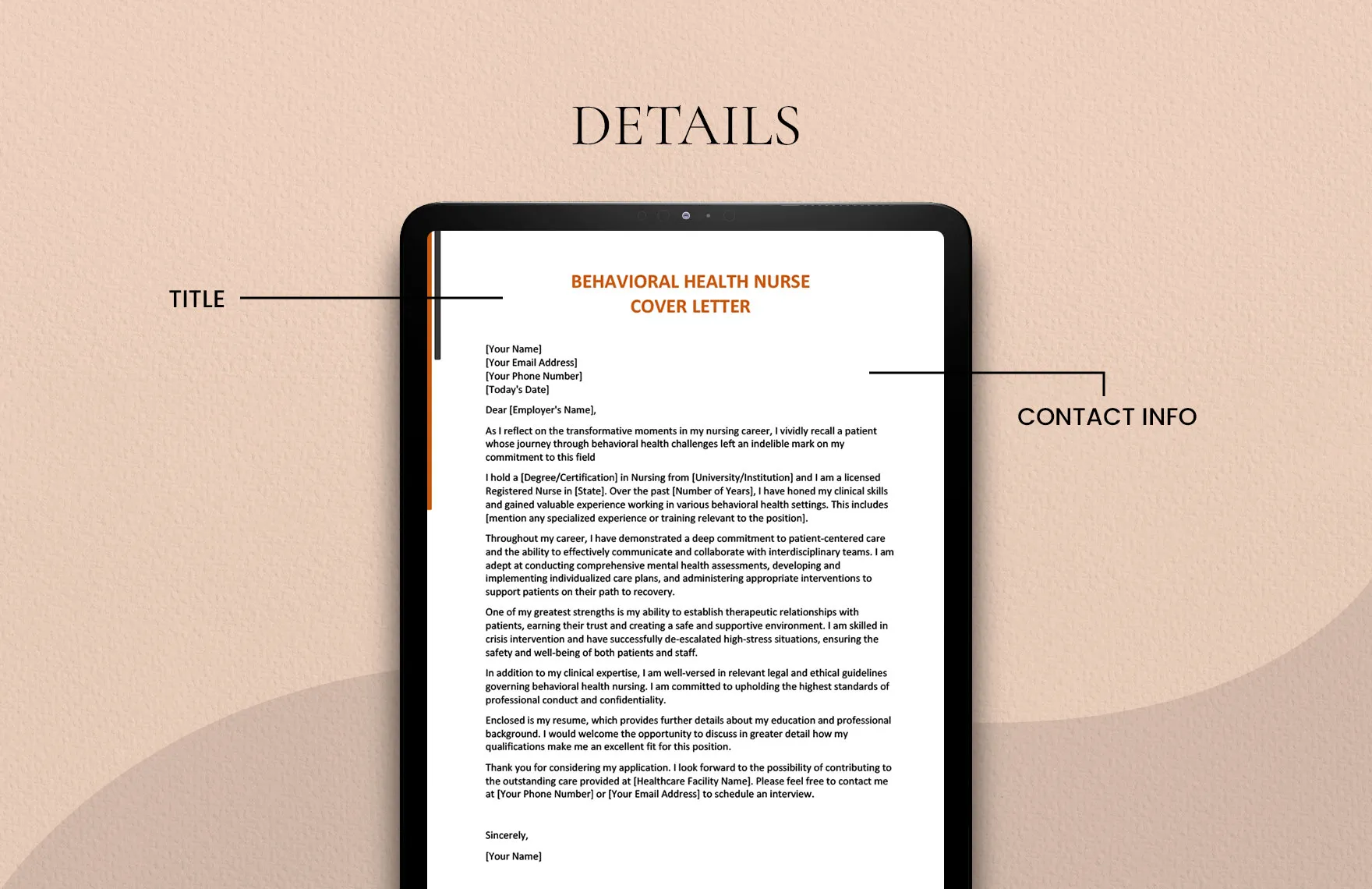
Mental health nursing demands a unique blend of clinical expertise, interpersonal skills, and emotional intelligence. Your cover letter should highlight these key skills, demonstrating to the employer that you possess the necessary attributes to succeed. Consider how you will portray your abilities when you showcase your skills, provide concrete examples of how you have applied these skills in the past. For example, how do you handle crisis intervention, or how do you communicate with difficult patients? By providing clear examples, you are showing the employer you understand what the role demands of you.
Clinical Skills
Clinical skills are at the heart of mental health nursing. Your cover letter must demonstrate proficiency in assessment, diagnosis, and treatment planning. Highlight your experience with different therapeutic modalities, such as cognitive-behavioral therapy (CBT), dialectical behavior therapy (DBT), or psychodynamic therapy. Mention any specialized training or certifications you possess, such as crisis intervention, suicide prevention, or substance abuse counseling. Provide specific examples of how you’ve used your clinical skills to improve patient outcomes. For example, you can explain how you’ve effectively assessed a patient’s mental state, developed a treatment plan, and monitored their progress. Show how you use your clinical skills to address the unique needs of the patient.
Communication and Interpersonal Skills
Communication and interpersonal skills are the cornerstones of effective mental health care. Your cover letter should highlight your ability to build rapport with patients, families, and colleagues. Emphasize your active listening skills, empathy, and ability to communicate complex information clearly and compassionately. Provide examples of how you’ve de-escalated crises, resolved conflicts, and fostered a supportive environment for patients. Show your ability to work effectively as part of a multidisciplinary team, collaborating with psychiatrists, therapists, social workers, and other healthcare professionals. Highlight your cultural sensitivity and ability to communicate effectively with patients from diverse backgrounds.
Empathy and Compassion
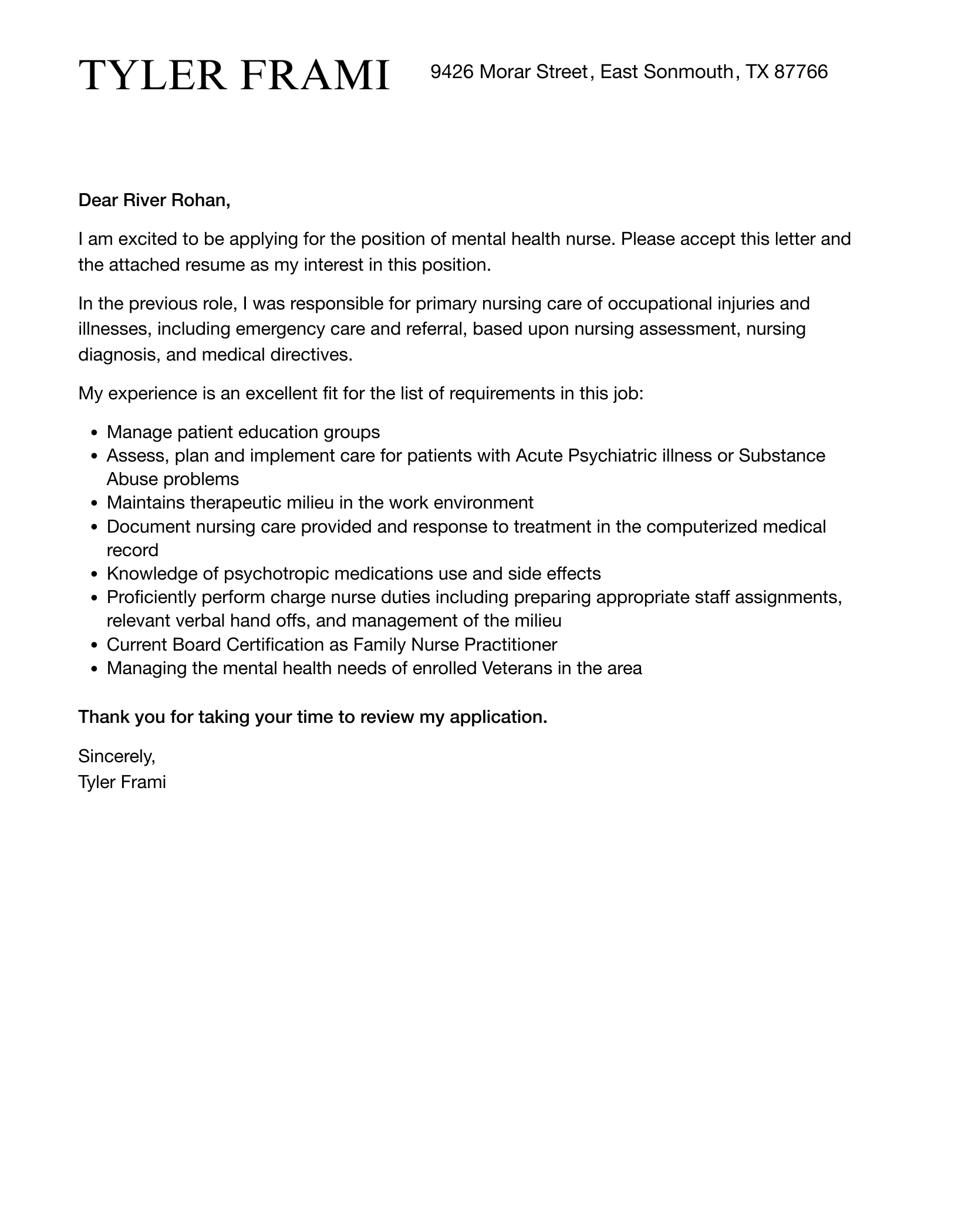
Empathy and compassion are essential qualities for mental health nurses. Your cover letter should convey your genuine care for patients and your commitment to providing them with the best possible care. Describe how you create a safe and supportive environment where patients feel comfortable sharing their thoughts and feelings. Explain how you advocate for patients’ rights and ensure they receive the support they need. Show examples of how you’ve gone above and beyond to support patients, whether it’s by offering a listening ear, providing emotional support, or connecting them with resources. Use specific examples to illustrate your empathy and how it translates into a positive impact on patient outcomes.
Experience to Emphasize
Your cover letter is a valuable opportunity to highlight your relevant experience and demonstrate your preparedness for the role. Go beyond simply listing your previous positions; instead, provide specific examples of how you’ve applied your skills and achieved positive results. Focus on experiences that align with the requirements of the job description and the needs of the patient population. Use the STAR method to provide context for your responsibilities. If you have experience working with specific patient populations, include these details so that the employer can see your experience with the patient population. By highlighting your relevant experience, you can showcase your ability to address the unique needs of the role.
Previous Roles and Responsibilities
Detail your previous roles and responsibilities, focusing on those most relevant to the mental health nursing position. Use the STAR method to describe your accomplishments in each role. Provide specific examples of how you’ve managed patient care, implemented treatment plans, and collaborated with other healthcare professionals. Highlight any leadership experience or involvement in quality improvement initiatives. When describing your responsibilities, emphasize the skills and competencies most valued in mental health nursing, such as assessment, diagnosis, therapeutic interventions, and patient education. This will demonstrate your ability to perform the duties of the role effectively.
Specific Patient Populations Worked With
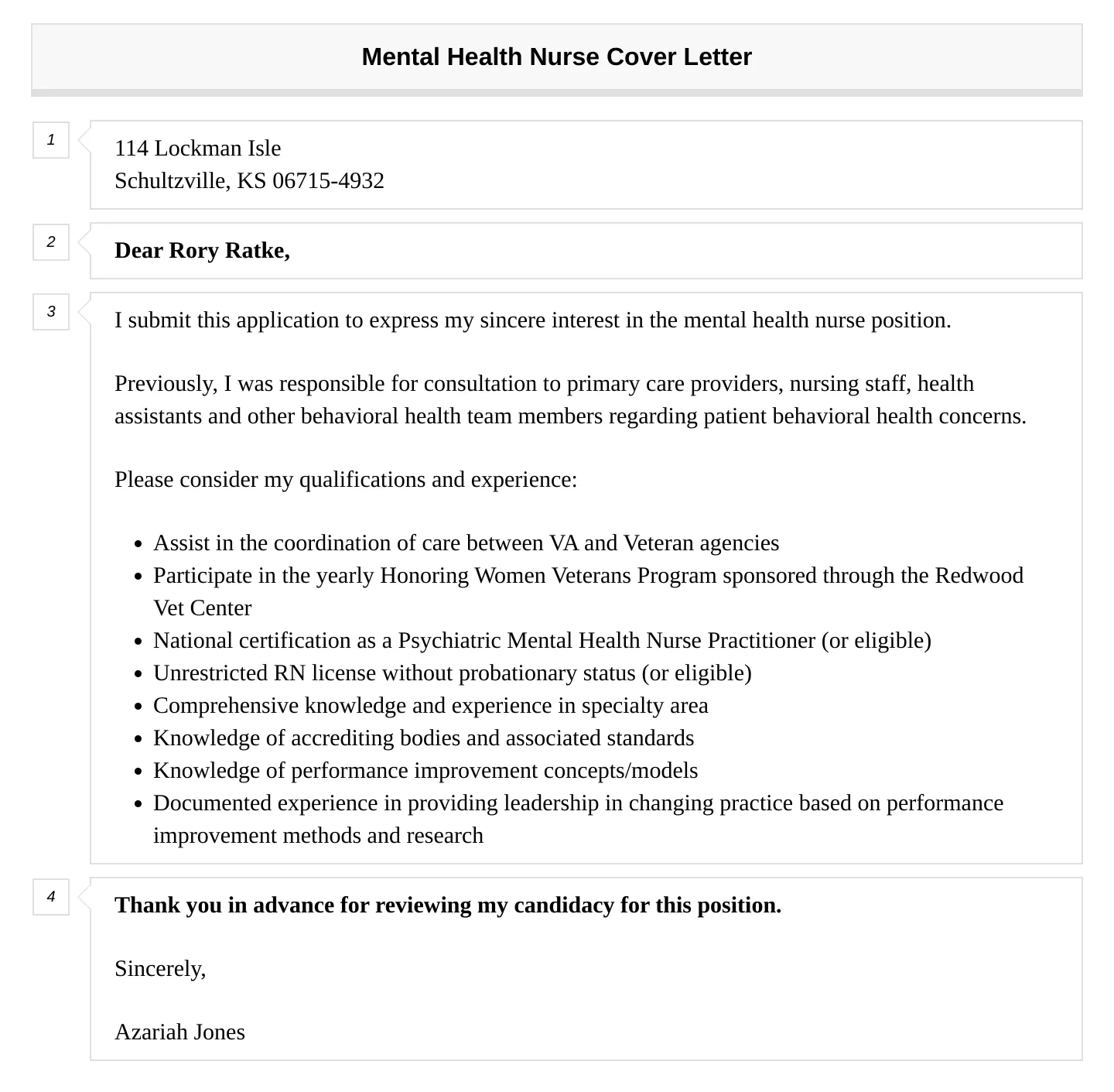
If the job description specifies a particular patient population (e.g., adolescents, geriatric patients, individuals with substance abuse disorders), be sure to highlight your experience working with that demographic. Describe your familiarity with the unique needs of these patients and any specialized skills you possess. Share examples of how you’ve tailored your approach to meet the specific needs of different patient populations. This is especially critical if you have experience in the area the employer is looking for. Employers are looking for nurses with experience working with different patient demographics.
Certifications and Specializations
List any relevant certifications or specializations, such as Certified Psychiatric-Mental Health Nurse (PMH-BC) or Certified Addictions Registered Nurse (CARN). Highlight any specialized training you’ve received, such as crisis intervention, suicide prevention, or trauma-informed care. Show your ability to meet the specific requirements of the role and demonstrate your commitment to professional development. This will show the employer that you meet the qualifications and are committed to continued learning.
Structuring Your Cover Letter for Impact
A well-structured cover letter is essential for making a positive impression on the hiring manager. Your cover letter should follow a clear and logical format, making it easy for the reader to quickly grasp your key qualifications and experiences. The language must be professional and error-free. Avoid generic opening and closing statements. Instead, tailor your letter to the specific role and organization. By paying attention to the structure and formatting, you can make a strong case for your candidacy.
The Header and Introduction
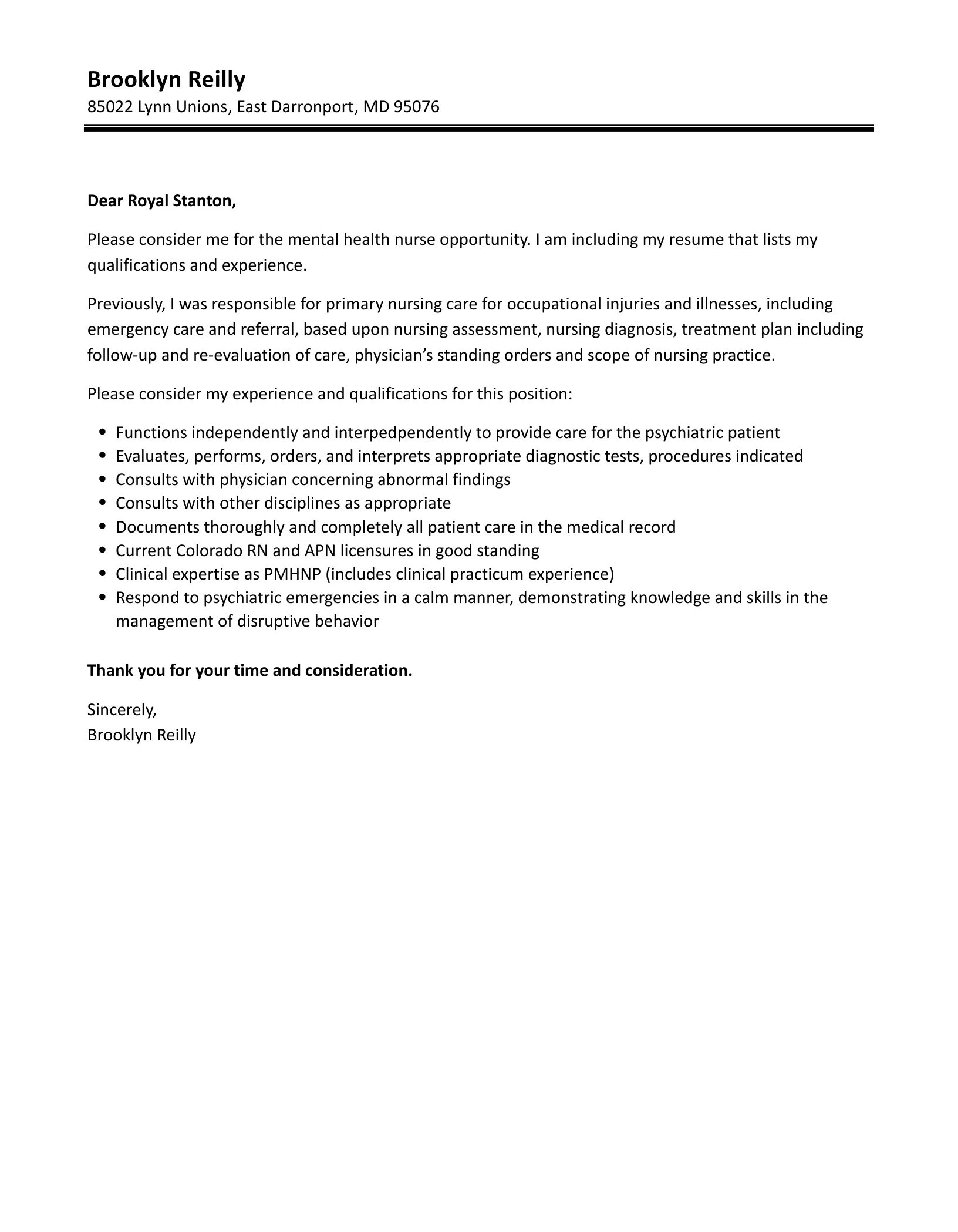
Begin your cover letter with a professional header that includes your contact information and the date. Address the hiring manager by name if possible; otherwise, use a generic salutation like “Dear Hiring Manager.” In the introduction, state the position you’re applying for and how you learned about the opportunity. Briefly highlight your key qualifications and express your enthusiasm for the role. Make sure your introduction is concise and engaging, capturing the reader’s attention from the start.
The Body Paragraphs
The body paragraphs are where you showcase your skills, experience, and passion for mental health nursing. Use these paragraphs to expand on your qualifications, providing specific examples of your achievements and how they align with the job requirements. Tailor your examples to the specific needs of the role and the organization. Be concise and focused, using clear and concise language. Use strong action verbs to describe your accomplishments, such as “managed,” “developed,” “implemented,” and “collaborated.” Your examples should illustrate how you have solved problems, achieved positive outcomes, and made a difference in patients’ lives. Use concrete examples of your experiences to demonstrate that you are a good fit for the role.
Addressing the Job Requirements
Carefully review the job description and address each of the key requirements in your cover letter. Clearly articulate how your skills and experience align with the employer’s needs. Provide specific examples to support your claims. If the job description emphasizes certain competencies, such as crisis intervention or experience with specific patient populations, be sure to highlight your experience in these areas. Show how you meet the expectations of the role by providing tangible evidence of your skills and experience. This is your chance to show how well you understand what the employer is looking for.
Showcasing Your Achievements
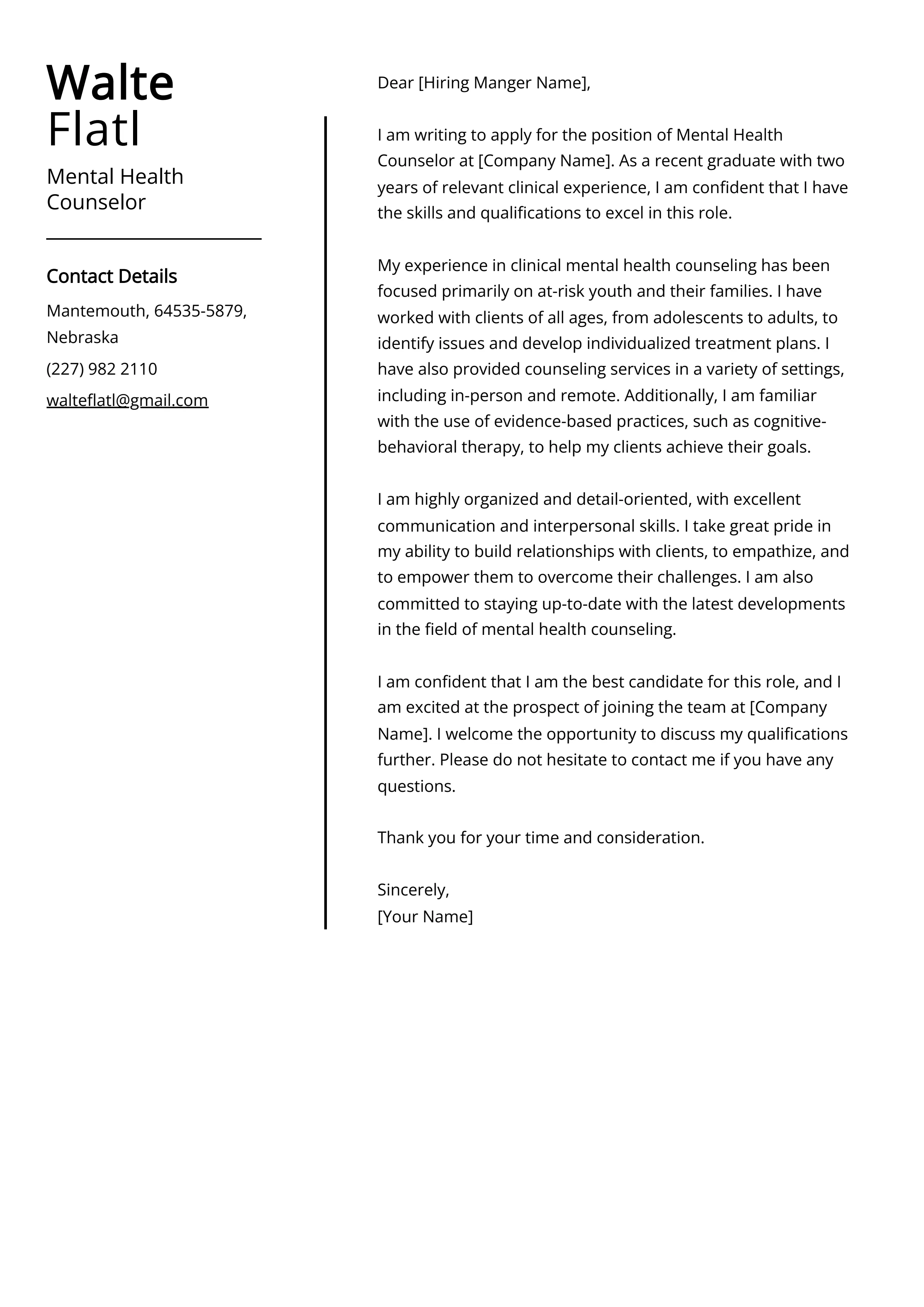
Don’t just list your responsibilities; highlight your achievements. Quantify your accomplishments whenever possible. For example, instead of saying “Managed patient care,” you could say “Managed care for 20 patients daily, resulting in a 15% reduction in patient readmission rates.” Use the STAR method to provide context for your achievements. Describe the situation, the task you were assigned, the actions you took, and the results you achieved. This will help the hiring manager to understand your impact on the job.
The Closing and Call to Action
In the closing paragraph, reiterate your interest in the position and express your enthusiasm for the opportunity. Thank the hiring manager for their time and consideration. Include a call to action, such as requesting an interview or offering to provide additional information. Proofread your cover letter carefully before submitting it. Ensure there are no grammatical errors, typos, or formatting issues. A well-written cover letter demonstrates attention to detail and professionalism, which are essential qualities in mental health nursing.
Expressing Enthusiasm and Availability
End your cover letter with a strong closing statement that expresses your genuine enthusiasm for the role. Reiterate your interest and highlight your qualifications. Mention your availability for an interview and provide your contact information. By expressing your enthusiasm and willingness to move forward, you can increase your chances of getting an interview.
